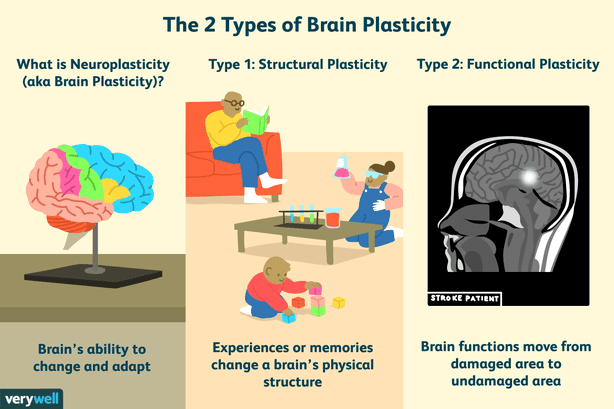Even though mental decline with age is common, many studies suggest it’s not inevitable. You’re not bound to grow old fumbling for words even though you were only trying to order your favourite cup of coffee.
Just like your body, your brain also needs to work out to stay sharp. It can get bored of routine tasks and needs a certain level of stimulation to preserve cognition (the ability to plan, foresee, focus and make decisions) with age.

Highlights
- The human brain shrinks with age but lifelong healthy habits and frequent mental stimulation can build cognitive reserves to preserve healthy brain functions,
- Adopting an active lifestyle and regular exercise can reverse the effects of ageing on the brain at any stage of life,
- Reading books and allowing your mind to escape into the fictional world can boost blood flow and balance frequencies across the brain, stimulating healthy neuroplasticity.
Before discussing some anti-ageing hacks for the brain, let’s briefly discuss what happens with age.
Do our brains shrink with age?
Research suggests that the human brain can lose up to 10% of its weight between the ages of 20 and 90. The brain can start to slow down as early as in your 30s.
Experts identify various reasons for this decline, including inflammation, diabetes and an unhealthy lifestyle. The neurons (brain cells) may start to deteriorate or communicate less, or the blood flow to the brain may decrease, thus decreasing the availability of nutrients and oxygen.
However, according to Dr Michael Merzenich, PhD, a neuroscientist at the University of California, the brain is a learning machine that can be trained to work faster and act younger. According to the US National Institute on Ageing (NIA), ample evidence supports the claim that the brain remains ’plastic’, i.e., it has the ability to adapt to new challenges throughout a person’s life.
Neuroplasticity is the brain’s ability to reorganize itself by forming new neural connections throughout life. As a result, the brain builds up a cognitive reserve that can counter the effects of brain shrinkage in older people.

Ten habits that keep your brain young
Research suggests that the brain remains plastic and can add to our cognitive reserves at any age. Here are a few habits that can keep the brain young:
1. Sharpen your wits with complex puzzles
According to Marcel Danesi, author of The Total Brain Workout, puzzles activate the entire brain because the ‘imagination is activated alongside reasoning or reckoning. Memory also comes into play, especially in word-based and maths-based puzzles.’
Various studies support the idea that daily use of puzzles can delay cognitive decline. Different types of puzzles exercise distinct brain parts and affect various mental skills. For example, according to Danesi, riddles or acrostics are likely to stimulate language areas of the brain because they deal with the faculty of language. Similarly, puzzles involving the logical placement of objects or symbols are expected to stimulate logic-processing areas.
Research identifies that complex or unfamiliar puzzles can be instrumental in building our cognitive reserves. They force the brain to think differently, make new connections and activate new parts of the brain.
According to cognitive neuroscientist Dr Caroline Leaf, ‘A good puzzle stimulates gamma activity in the brain, which is excellent for creativity and keeping the brain young.’
2. Set your mind adrift
Letting go and allowing the mind to wander from one thought to another can engage 200 different parts of the brain. Dr Leaf advises to ‘walk and immerse yourself in a conversation with your mind, noticing all the details of everything around you.’
Excessive mental stimulation can cause stress, which can disrupt cognitive processes and consequently limit the quality of human life. A light stroll in the park or activities like yoga and meditation can help you loosen up. Sit idly for a while, even if you’re just looking out of the window. Studies suggest that it will let your mind have a break from the constant stimulation and flow of data.
3. Keep your blood sugar levels in check
According to Carol Greenwood, PhD, a geriatric research scientist at the University of Toronto, diseases like high blood pressure, obesity and type 2 diabetes can make life challenging for the brain, so it’s crucial to avoid foods that can spike your blood glucose level and BMI (body mass index, a scale measuring obesity).
Research links high BMI to a decline in brain health due to an increased risk of neurodegeneration.
4. Skip scrolling and pick up a book
Reading is instrumental to increasing our mental capacity, but studies suggest that it can literally expand our minds too. For this to happen, Dr Leaf explains that you’ll need to let your mind escape into the fictional world. Doing this can boost blood flow and balance the frequencies across the brain, stimulating healthy neuroplasticity.
5. Move your body
According to Dr Donald Stuss, PhD, a neuropsychologist and director of the Rotman Research Institute at Baycrest Centre for Geriatric Care in Toronto aerobic exercise is one of the best ways to keep the brain young.
Exercise stimulates nerve cell production (especially in the memory centre, the hippocampus) and increases the connections between the existing neurons. At the same time, it increases the blood supply to the brain due to the formation of small blood vessels (capillaries) in the brain. Thus, adopting an active lifestyle can make the brain more plastic and adaptive, increasing efficiency.
The preeminent brain-health researcher Arthur Kramer and his colleagues also found that working out can make people smarter at any age, even if they’ve been overly sedentary recently. Another study on Swedish women found that high cardiovascular fitness delayed the onset of dementia by almost a decade compared to those at medium fitness level.
6. Keep your brain well-fed
Eating a healthy, balanced diet keeps your brain young and active. Colourful fruits and veggies, beans, fish, nuts, spices and other foods for the brain can prevent cognitive decline and memory loss due to their potent antioxidant properties.
Antioxidant-rich foods are the best for the brain as they neutralize free radicals, which are harmful to our bodies and can damage brain cells. Tea and coffee are also great at offloading free radicals from the body.
7. Shake things up a bit
Although humans take comfort in routine, novelty is crucial for brain health. Moving the schedule around regularly can keep the brain young and boosts its ability to learn new info and retain it.
It doesn’t have to be something drastic. Small things like trying out a new recipe or even using your non-dominant hand can wake up your mind. The ultimate goal is to get out of your comfort zone and perform neurobics, a term coined by neurobiologist Lawrence Katz, PhD, co-author of Keep Your Brain Alive.
Neurobics are simple exercises or activities that aim to stimulate multiple senses in unique ways. According to research, the brain learns better if more than one sense is engaged in the learning process. These activities are designed for the preservation and growth of nerve cells.
8. Laugh it off
High levels of the stress hormone cortisol can impair the brain’s ability to learn and retain information. That’s why it’s essential to indulge in humour since it signals the body to release dopamine, the feel-good hormone.
More research is needed to verify whether humour can make you smarter, but one study found it could improve short-term memory. It compared the memory test scores for people who watched a funny video with those who sat through the memory test without any distractions. The people who watched the funny video scored better on their memory tests.
9. Build strong social ties
When you meet people and bond with them, your brain gets constant stimulation. The increased mental activity improves attention and memory and can decrease your risk of dementia by 40%. However, research hints that it’s not the quantity but the quality of social interaction that decreases this risk.
Old friends and family are the best people to hold meaningful interactions with. Visiting your local community centre or library, or joining online book clubs, communities and courses can be an excellent way to meet new people interested in the same things as you.
10. Let the music play
According to a Johns Hopkins ENT specialist, music provides a total brain workout. Our mind has to pay more attention and get stimulated when listening to unfamiliar music. But, on the other hand, listening to familiar playlists can boost memory and mood. Therapists are known to use drumming to help patients with Alzheimer’s who normally don’t respond to external stimulation.
Conclusion
It was once believed that if brain function is lost, it’s impossible to retrieve it. Use it or lose it is a popular maxim in this regard. But research on neuroplasticity lends credence to the idea that you can rewire your brain. The brain is designed to be challenged and stimulated. In fact, the brain can retain and improve its functional abilities at any age. While exercise, diet and blood sugar maintenance are some of the most significant factors influencing health and rejuvenation, the mind needs cognitive stimulation through novel challenges to stay sharp. You can do this through engaging in reading, listening to music, participating in community or family activities, and completing puzzles.
However, it’s crucial to avoid overstimulation. The mind also needs downtime to let the thoughts wander freely and take refuge in familiar music and lots of laughter.
Disclaimer:The contents of this article are for general information and educational purposes only. It neither provides any medical advice nor intends to substitute professional medical opinion on the treatment, diagnosis, prevention or alleviation of any disease, disorder or disability. Always consult with your doctor or qualified healthcare professional about your health condition and/or concerns and before undertaking a new healthcare regimen including making any dietary or lifestyle changes.
References








